Memories of Oxford
This piece was written for the Philippine Daily Inquirer. It was published in daily’s Travel Section in 1997. All pictures were taken with a still camera (there were no DSLRs back then!) and are under copyright.
Spring, England. I am on a bus bound for Oxford with 19 students from the different Manila universities. Having barely slept from the 13-hour flight, my colleges, I sit quietly beside the window, clutching a blue demin backpack containing a few essentials, a new hallmark diary and two favored Nikon cameras, filling my vision with sights of greens and small country houses, dreaming of the adventure that awaits as we neared the prestigious town, which is to be my home for a month.
I am a born wanderer, and this is not my first time in England. I was in London a year ago with my family for three days during a Central Europe sojourn.
Photo: Oxford University
As the bus enters the town, I am pleasantly surprised to discover that Oxford, 50 miles northwest of London, has none of the somber drabness of the English capital’s skyline. Oxford at first glance looks like a friendly small town straight from the medieval fairy tales.
The bus makes its way through the edge of the town, and my eyes are bombarded by line upon line of well-trimmed Georgian houses, gleaming in the morning sun. The bus stops at Wosley Hall, in front of a newly renovated, three-story Victorian house. A well-placed placard outside the building announces that we are in front of the UTS school of English. We all rush out and are suddenly overwhelmed by the cold that greets us despite the sun’s rays.
A balding man comes to meet us, introducing himself as Luke, the school administrator. He tells us that we Filipinos must have brought the sun with us. I am to discover that we, by some rare coincidence, have truly done so. Just two days before our arrival, it was snowing here.
After a test in English proficiency, we are called out one by one outside to meet our host families. Tomorrow, we go back for our first day of class. I meet my foster mother Valerie, a tall woman, in her forties with short red hair. Beside her are two smiling girls in their teens. They introduce themselves as Victoria and Samantha.
Together, we try to carry my 2-ton luggage down the steps of the Wosley Hall. We board a local red bus. I am treated to the sight and sounds of a city built almost 10 centuries ago. As we near the city centre, the small stone houses give way to big limestone structures with oval-shaped wooden doors. These structures are the colleges, libraries, museums and student residences that make up the Oxford University. There are 36 colleges in all at Oxford, dating from almost every century, superb examples of the work English architects dating as far back as the Renaissance.
Technically, there is no campus that can be labeled as the ‘Oxford University’ because in a broad sense the ‘University’ as Oxonians know it, is an umbrella organization that comprises all the colleges and teaching institutions. Alongside these majestic structures is a sprinkling of small, quaint stores: bookshops, salons, bread-and-breakfast cottages, and boutiques. The blend of grand and rustic architecture is charming.
As we move away from the centre, another aspect of Oxford presents itself. Like a beautiful painting, the Oxford countryside appears before me. I see a field of yellow flowers. The girls promise to take me there this afternoon.
All four of us push the luggage up the inclined plane to 20 Mather Road, a small terra-cota country house with a small garden up front, bordered by a low stone fence. As we enter the door, I am greeted by Benjamin, a friendly black Labrador–the family pet.
The house is small but cozy, well lighted, decorated with family pictures, painting of dogs and stuff. In the center of the living room is a fireplace. My room, which is nearest the stairs, is a simple white corner complete with a wooden bed, a study and a walk-in closet, its door doubling as a full-length mirror. Beside the window, on the edge of my fluffy is an accordion-looking metal contraption, which I discover is a radiator, to keep me warm during the crisp spring nights. For many days, I shudder at the thought of touching it for fear that I might get electrocuted. I discover later that it is run by coal.
“You, all right, Jenny?” Valerie pleasingly asks in a sing-song manner as she ushers me to the kitchen where Victoria is preparing lunch with a big table knife. Lunch is a 2-ft. long baguette, chopped into pan de sal sizes and garnished with tomatoes and cheese. I glumly wonder if I will be eating the same hard, tasteless bread for the rest of my stay. To help the bread along, Valerie gives me a cup of tea mixed with milk and honey–my first real English beverage.
The afternoon is spent with Vic, Sam and their neighborhood friends, the youngest barely 5 years old. They take me to the barn to show me the chickens, the goats and those gigantic cows. Peter, the youngest in the bunch, excitedly points them to me, babbling in incomprehensible English as he does so. Before we go back for dinner, we traverse a small stream, and cross over a wooden fence, with me logging breathlessly behind, to reach the promised land–the field of yellow flowers.
The kids tell me that this plot of land is co-owned by the people who live in the area. The flowers are actually mustard plant flowers. I linger a while enjoying the view, feeling a little foolish that I left my camera behind.
We eat dinner at half past five, too early for a Manilan a like me. I wonder if the food will carry me through the night. But seeing the size of the platter makes me change my mind. Valerie serves me shepherd’s pie, which is not really a pie but mashed potato mixed with beef and peas. The serving is so big that I gulped down two pitchers of water. Dinner in England is called tea time. “Will you come home for tea?” I remember Valerie asking before I left with the kids this afternoon.
At the dinner table, Victoria invites me to watch a football game in the village green. Football, the American counterpart of soccer, not rugby, I discover, is the country’s favorite sport.
At six, Valerie’s husband Nick, the splitting image of Victoria, comes home. He greets me politely and disappears to the living room to catch the World Cup.
When the girls and I set out for the village green at seven, the sun is still shining brightly. There I meet some locals who keep addressing me as “the student” No one seems to mind my being Asian.
The next day I wake up to the sound of birds singing. I force myself out of bed. I have to get ready for school. While finding my way to the correct bus stop, I see students, attired in classy Oxford suits, male and female alike, hardly losing an inch of poise as they rushed to their respective colleges on bicycles. I guess the bus fare is just too expensive for someone living on school allowances.
A ride to the city centre from our place costs roughly about fifty pesos. Lucky for me, I have my bus pass, which is fully paid for by the school.
Puffing up the steps, I beat the school bell. The school is full of students of all colors: Asians, Caucasians, Hispanics, all here for one purpose: to learn English. My module includes Business English, rhetorics, English drama and English culture. I find out that Filipinos are highly regarded at UTS for their skills in English. Thus, in the mornings, we join the advanced classes. And in the afternoons, we get to mingle with students from other countries. The classes are quite light. The teachers are mostly Oxford students who wanted to earn extra money.
Photo: An English Tower
Classes end at 3 o’clock. Students are free to pursue their own activities after school. Still, the school organizes parties, sport fests, barbecues and other fun activities for the students. For my first after school activity, I join an Oxford treasure hunting trail. The trail takes my trail partner Maureen and me to the famous sights in Oxford: the Sheldonian Theater, where they hold the university’s opening ceremonies each year; the Christ Church, one of the oldest colleges; Oxford’s very own Bridge of Sighs, which connects two adjacent colleges; and the famous Bodlean Library, a old dome-like structure so high-tech it uses conveyor belts underneath the ground to transport books to the 36 colleges.
The treasure leads us to a 15th-century pub inside a narrow passageway. We turn a corner to find Sarah, the treasure trail master, drinking wine under a cherry tree with pink flowers in full bloom. We join her and collect our prize–gift certificates from the local HMV record store.
Every day for a month, my calendar is full with school, social activities and out-of -town excursions. One spring night, our teacher in rhetoric takes us to watch a formal debate by the Oxford Union. On May Day, a national holiday for the Brits, when they loosen up and do crazy things like jumping over the bridge, my classmates and I go punting on the River Cherwell, to get a view of Oxford from the waterfront. On Fridays, my Filipino collegues and I go to the theatre, ironically to watch the latest American movies, which cost us about 135 pesos.
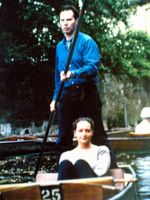
Photo: Punting at the River Cherwell
As Oxonians love hanging out in the pub, we also go pub-hopping to try to “inhale” some local culture, but it can prove to be quite dangerous for a person like me who’s allergic to cigarette smoke.
But what cherish most about my stay are the times I spend alone, getting lost in the nooks and crannies of this fascinating little town. In Oxford, every corner brings a wonderful surprise. One minute I am buying some toiletries at a modern supermarket in the main street and with a turn, I am transported back to the bygone times, as I walk down the cobbled steps and find myself in front of a 16th century Anglican church.
And I love shopping in the City Centre:browsing through the old bookshops, scouting for dresses at the local boutiques. Things are not exactly cheap in this town. Everything is taxed. Resourcefulness helps a lot. I, for example, discover a bookstore which sells a complete volume of Charles Dickens’ works for only 99p or roughly 45 pesos. For clothes, I go to the children’s section, the only tax-free section, and buy clothes for 13-15 year olds. One schoolday, I rush to the stores to buy a 450 peso black dress that I wear to a formal affair that same evening.
Much of my memory of Oxford is warm because of my host family. From Valerie, I discover that most Oxonians are middle-class working people, with hardly anything to do with the university. In fact, a lot of them could only dream of getting an Oxford education.
Most people go to work after they finish middle school.
Nick and Valerie, who take in foreign students to augment the family income, are no different. Nick works as a glacier, fixing windows and glass panels for a local company. Valerie prefers to stay in the house to look after the children. But at lunch time, when Vic and Sam are in school, she volunteers at a school for disabled children.
Valerie and Nick are simple, endearing people, who enjoy gardening, watching BBC documentaries and soaps on the “telly.” One Saturday night, I am amused to find them in front of it, catching lotto results. They tell me they buy lotto tickets every week and pushes me to try my luck. A Pakistani woman won the grand price the week before. Their suggestion makes me wonder if I am not actually talking with a Filipino couple disguised as middle-class European.
Photo: Carousel Ride in London
One crisp night a week before my departure, Nick prepares a barbecue in my honor. He tells me he would have ordered Chinese take-out except that it would have been too expensive.
I feel guilty. Some nights when I crave rice, I go to the Chinese restaurant in front of the MGM theatre to for some “real” dinner before I go home. I am humbled by their simple lifestyle. A lot of the things I do back home will be deemed too luxurious by this family that comes from the richest of the first-world countries.
Nick takes out the chicken and the marinating sauce. He begins to marinate the chicken as I ask him what he thinks about the royal family.
“We basically don’t care about them,” he plainly replies with losing his trademark politeness. “We think they are snobs. And they waste the people’s money.”
Then, he goes on to explain to me how to cook the chicken. I trail behind him as he goes to the backyard to build to build fire. After half an hour of fanning the flame and treating the chicken with Nick’s special sauce, the three of us sit there relishing the food, with Nick occasionally feeding Benjamin some chicken bones. The sun has finally set. As I sit there taking in everything, I hear some familiar childhood tune playing in a distant. Nick tells me it’s the ice cream man.
One again I find myself back on the bus, this time to leave the charming town that was my home for a month. As we travel to the airport, I get a last glimpse of the rows of houses that line Oxford. Then it appears before me again–the field of yellow flowers–my field of gold. It does not look as splendid now as it did on the day I arrived, for spring has slowly given way to summer.
Still, I feel a tug at my heart as I watch the remaining flowers gracefully sway with the summer breeze, somehow orchestrating a farewell dance just for me.
My wanderings always leave me a little weary and blaše. But not this time. Oxford has been most worthwhile. (1995)
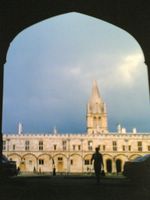





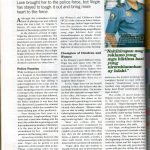
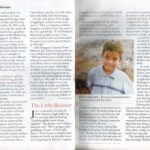

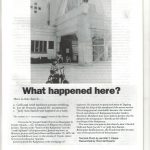
 Jenn C.
God-lover.
Milk & TV Producer.
Writer.
Entrepreneur. Natural Health Advocate.
Jenn C.
God-lover.
Milk & TV Producer.
Writer.
Entrepreneur. Natural Health Advocate.






I really enjoyed reading this account of Oxford life. You have done something I would love to do–study at one of the greatest universities in the world. I’ve visited Oxford as a tourist but would love the opportunity to go there as a student. Thanks for posting this, it was quite enjoyable.
You are most welcome! Oxford holds yearly summer classes for foreign students under the Oxford Programme. I’ll email you the details if you are interested. Hope you post your name & email in my tagboard. God bless! 😀
hi jen, this is amazing! i didn’t know you took summer classes at Oxford…must have been quite an experience. hope you can post more travel blogs. =)